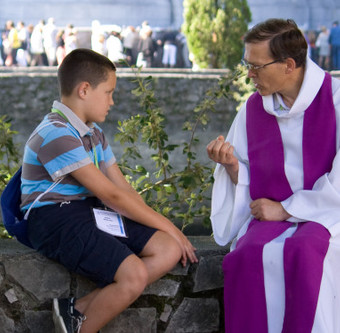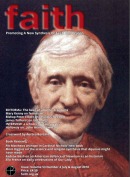
Interview: The challenge of the classroom
Article:
01.07.18
Joanna Bogle interviews Father Matthew Pittam
Fr Matthew Pittam is a priest of the Ordinariate of Our Lady of Walsingham. His book Building the Kingdom in the Classroom: A school Chaplain’s diary has caused considerable interest as a frank and fascinating account of life in a modern Catholic secondary school. FAITH magazine had difficulty catching up with him as he is a busy man – but it was well worth it.
We asked him first why he had written the book.
“I thought that there was a place for something about ministry to young people in our Catholic schools. I feel that two extremes exist: one where people are overly optimistic about Catholic Schools and see things through rose-tinted spectacles. and on the other, those who seek to dismiss Catholic education completely. I wanted to write something which celebrated our schools but which also does not shy away from the considerable challenges and concerns that many have.
“I am passionate about work with young people, but also recognise that there is much to be done to ensure that schools are Catholic in more than just name only, which sadly many are becoming. I also wanted to write something which could encourage others to think about either teaching or school chaplaincy as a vocation. The Catholic life in our schools will only grow if we have fired-up Catholics, with a strong sense of vocation, staffing them.”
Catholic schools
Why are Catholic schools so popular? They are often over-subscribed.
“Parents appreciate the values and outlook of a Catholic school. Pastoral care is also something which is distinctive in many of our schools and there still exists in many a strong sense of community . A high proportion of Catholic schools also have high levels of attainment academically. “
“We live in a highly consumer age and education does not escape this. Parents (and young people) approach education with much more of a consumer mind-set than ever before. This certainly becomes manifest in the way in which parents approach the choice of schools. It is no longer given that children will attend the local school. Parents consult league tables and Ofsted ratings. In that sense there is less loyalty to a particular school (or faith tradition) which may have been a much more significant factor in the past.“
“This is certainly evident in my local town, where the Catholic school closed because of falling numbers and poor attainment. This was following a long spiral of decline assisted by the strong pull of local Grammar Schools (We still have selective schools in this area). Catholic parents chose the selective schools over the Catholic school and over time the Catholic life and character simply ebbed away. So we sadly shouldn’t assume that the Catholic element is the primary attraction of our schools.”
Priesthood
Fr Matthew initially trained as a social worker, with a strong sense of a call to help people who suffered from mental health problems. What drew him to the priesthood?
“Social work did provide fulfilment, and I am actually still a registered social worker and do some work there. However over time I began to discern that there was more - that God wanted me to care for the vulnerable but in a way which social work couldn’t. I knew in my heart that we only reach our fullness when we are growing in communion with God.
“In due course I was ordained in my Anglican diocese and served in a working class parish in the suburbs of Coventry. This was a good and positive time but from the Catholic tradition within the Church of England, I always really looked to the Catholic Church. When the Ordinariate came into being I realised that the Church was making an invitation which should not be refused and so I responded in trust.”
Freedom?
Do we, as Catholics, have full freedom to teach the Faith in modern Britain? There is a sense in which we feel rather vulnerable.
“I do think that our freedom to teach the truths of the Christian faith are potentially under threat. We have strong leverage as the 2nd largest provider of education in England and Wales. But we need a strong lead from our Bishops and the Catholic Education Service. Catholic schools have a more important vocation than ever to provide a prophetic message - an alternative to the prevailing materialistic, consumerist and secular values.
“The moment when we start to compromise is really the time when we should be asking serious questions about the future of our schools. We are custodians of a legacy. Many of our schools were hard-won through great sacrifice and determination in the face of some opposition. We need some of that pioneering spirit and determination today.”
And the future?
“We face very challenging times: up against a prevailing culture which does not value religion or the place of the Church, or understand it. Many young people’s lives are so complicated and family life is often fragmented. Catholic schools (or even parishes) cannot compensate for what is lacking in family life. Creative youth work, schools, engagement with social media will all help but if we do not evangelise and seek transformation in family life then our young people will continue to grow up with a secular and material world-view which sees no place or relevance for faith”
The Ordinariate
Finally, we asked Fr Matthew about the Ordinariate. Has it fulfilled the hopes that were placed in it on its foundation? He pondered this and then illustrated his comments with a thoughtful list.
“It is a disappointment that fewer Anglican clergy than hoped have showed an interest in the Ordinariate. Many I knew for years, who were at the forefront of the Anglo-Catholic movement, continue to remain wedded to the CofE. I think that there are complex and contradictory reasons why many remain:
“- Money and Security. C of E clergy are fairly well provided for. A house, generous stipend (In comparison to a Catholic priest) and non-contributory pension are all part of the package. It is a huge thing to walk away from that, especially when clergy have to provide for a family.
- Loyalty. A number of friends who remain in the C of E have a great deal of loyalty to their parishes, the Anglo Catholic movement and a sense of Anglicanism. There is also a concern from some that to seek ordination in the Catholic Church is to deny their Anglican Orders and ordination
- Status. Anglo Catholics are often big fish in a small bowl. Vicars still have some status in a parish and to leave all this is a big concern for some. I knew one priest who didn’t become Catholic because he was in a large and fairly important parish and didn’t wish to become a curate again.
- Sexuality. A number of Anglo-Catholic clergy are in same-sex relationships thus: a stumbling block to those who would wish to seek ordination in the Catholic Church. There are also Anglican Clergy (including some traditionalist bishops) whose marriages would be considered irregular by the Catholic Church and so would prevent ordination.
- bricks and mortar- Many Anglicans are wedded to their buildings and would struggle to leave a building and community which has been so significant in their lives. Some of the laity who were received with me seven years ago found this one of the hardest sacrifices to make.“
Notes:
Joanna Bogle is Editor of FAITH magazine
Fr Matthew’s book Building the Kingdom in the Classroom: a School Chaplain’s diary, is published by St Paul’s Books, £11.99p





